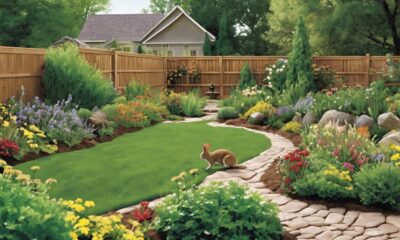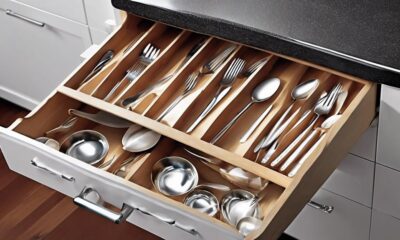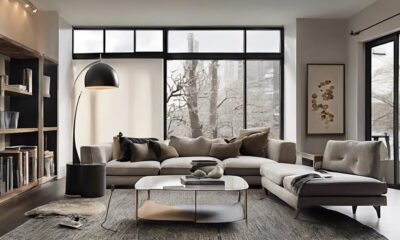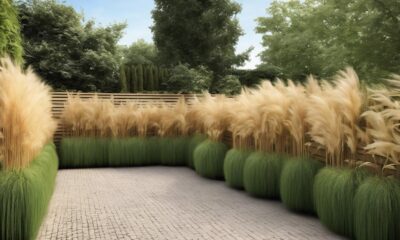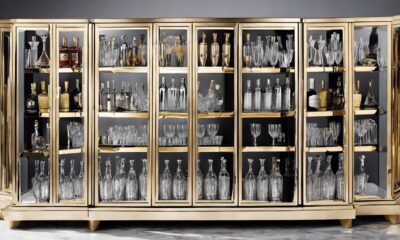Architecture Home Styles
How a Person Can Live in a Barn: A Step-by-Step Guide
Nurture your curiosity as we unveil the secrets of transforming a barn into a livable space, blending preservation with innovation.
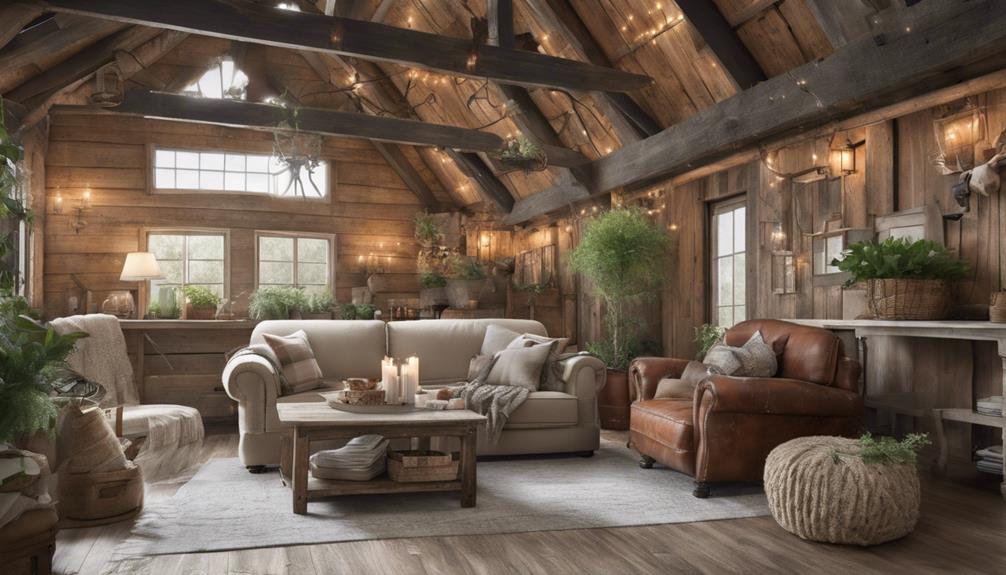
When starting the process of converting a barn into a usable living area, it is important to carefully weigh the delicate balance between preserving its original charm and incorporating modern innovations.
Striking this delicate equilibrium requires a keen eye for detail and a willingness to embrace the challenges of repurposing such a unique structure.
From repurposing the existing layout to incorporating modern amenities, each step in the process holds the promise of creating a truly one-of-a-kind living environment.
Key Takeaways
- Scout ideal barn location with structural assessment for safety and compliance.
- Design living space with rustic charm and modern comforts for a cozy ambiance.
- Install essential utilities like water, electricity, and heating for functional living.
- Personalize with unique design elements and final touches for a customized barn home.
Finding the Perfect Barn Location
When embarking on the adventure of living in a barn, our first step is to scout for the idyllic location that will serve as our rustic sanctuary. As we search for the perfect barn, we must consider factors beyond just aesthetics. It's crucial to ensure the barn complies with local building codes and zoning regulations to avoid any legal hurdles. This not only guarantees a smooth transition into our new dwelling but also provides peace of mind knowing our living situation is secure.
Assessing the barn's structural integrity is paramount. We need to carefully examine the foundation, walls, and roof to determine if any renovations or repairs are necessary. Selecting a barn with a solid structure not only ensures our safety but also minimizes the need for extensive and costly renovations down the line. By prioritizing building codes and structural integrity in our search, we lay a strong foundation for our barn living experience.
Assessing Barn Structural Integrity
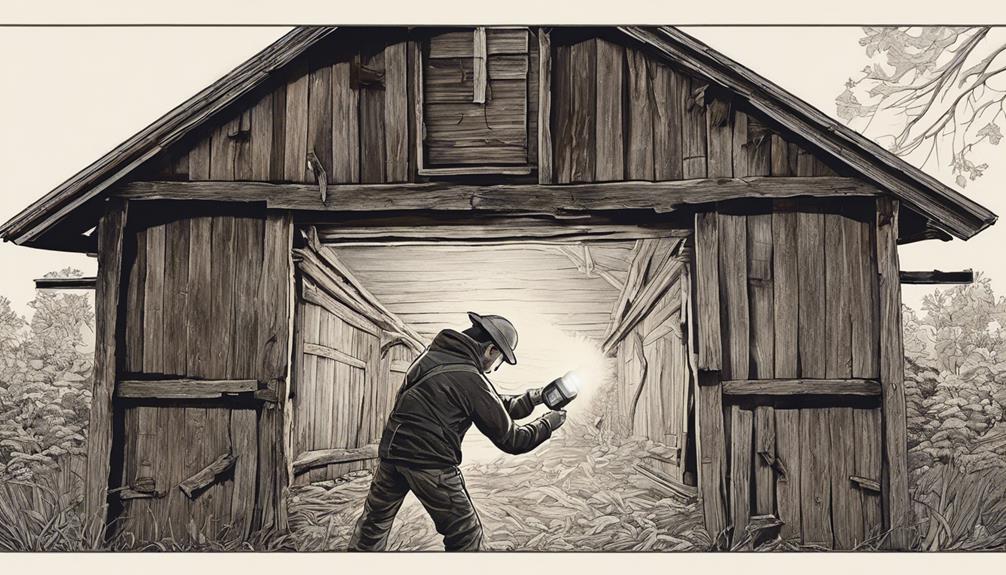
To ensure our safety and the structural soundness of the barn, we meticulously inspect for signs of rot, decay, or pest infestations in the beams, walls, and foundation. Checking the roof materials and wood frame is crucial for a secure living environment. Here are some key points to consider:
- Listen to the creaks and groans of the wood: Each sound tells a story of the barn's history, revealing its strength and vulnerabilities.
- Feel the texture of the beams: Run your hands along the wood to sense any roughness or soft spots that could signal decay.
- Smell the earthy scent of the barn: Take in the aroma of aged wood and hay, connecting with the barn's essence and integrity.
- Observe the play of light through the roof: Sunlight filtering through can highlight areas needing repair, showing where the structure may be compromised.
- Embrace the solid feel of the walls: Lean against them to feel their strength, appreciating the steadfast support they offer.
Designing the Barn Living Space
After ensuring the barn's structural integrity, our next step involves envisioning and creating a living space that seamlessly blends rustic charm with modern comforts. To make the most of the barn's layout, consider open floor plans and high ceilings for an expansive feel. Harness the beauty of natural light sources by incorporating ample windows and skylights, illuminating the interior and creating a warm atmosphere. Embrace the barn's roots by integrating rustic elements such as exposed beams and reclaimed wood, infusing the space with authenticity and coziness. For functionality and style, opt for sliding barn doors to separate different areas while adding a touch of charm. When selecting materials, prioritize durability and ease of maintenance with options like polished concrete floors or hardwood. The table below illustrates key design considerations for maximizing space and light in your barn living area:
| Design Aspect | Description | Benefit |
|---|---|---|
| Open Floor Plans | Create a spacious feel | Allows for additional space |
| Natural Light Sources | Incorporate windows and skylights | Brightens up the living space |
| Rustic Elements | Exposed beams, reclaimed wood | Adds charm and authenticity |
Implementing Essential Utilities
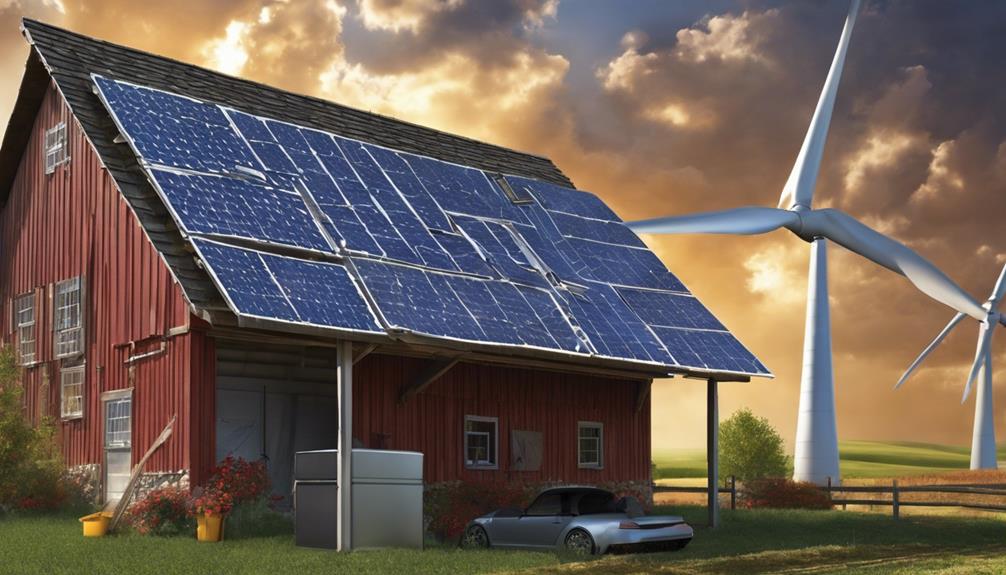
With our vision set on transforming the barn into a comfortable living space, our focus now shifts towards integrating essential utilities to ensure functionality and convenience. To make our barn home a haven, we must consider the following commonly used options available:
- Water Supply: Installing a well or connecting to a municipal water line for drinking, cooking, and cleaning needs.
- Electricity: Choosing between solar panels, generators, or grid connection for lighting, appliances, and power tools.
- Waste Disposal: Deciding on a septic system installation or connecting to a sewer line for proper waste management.
- Heating and Cooling: Exploring options like wood stoves, HVAC systems, or radiant floor heating for climate control.
- Internet and Phone: Setting up satellite internet or cable connections for communication and entertainment purposes.
Personalizing Your Barn Home
As we continue shaping our barn into a personalized living space, our next step involves infusing unique design elements and finishes that resonate with our individual style and preferences.
Personalizing our barn home doesn't have to break the bank; there are plenty of less expensive options to achieve a custom look. Consider adding a pop of color with vibrant paint choices or incorporating textures like reclaimed wood or metal accents for a rustic touch.
Customizing our barn home allows us to express our creativity and make it truly unique. From barn-style metal roofs to aluminum gutters and fascia caps, there are endless possibilities to add special touches that reflect our personality and lifestyle.
Frequently Asked Questions
How Do You Make a Barn Livable?
To make a barn livable, we focus on several key aspects:
Insulation: Insulating the walls and roof helps maintain a cozy temperature.
Plumbing and Electrical: Installing proper plumbing and electrical systems provides essential amenities.
Room Division: Separating rooms for different functions ensures functionality and privacy.
Windows: Installing windows allows natural light and fresh air to enter the space.
Furnishing: Furnishing the barn with furniture and appliances creates a comfortable living space.
Can a Person Live in a Barn?
Yes, we can live in a barn! With determination and creativity, a barn can transform into a cozy home. Imagine the freedom of wide open spaces within the rustic charm of a barn.
What Do I Need to Know Before Building a Barn?
Before building a barn, we need to understand local building codes for compliance.
Selecting stable ground with proper drainage is crucial. Site preparation involves clearing and leveling the area.
Digging a trench for the foundation, filling it with rods, crushed rock, and concrete ensures stability. A strong foundation is vital for structural integrity.
These steps are key in creating a durable and safe barn structure that meets regulations and serves its purpose effectively.
What Do I Need in a Barn?
In a barn, we need essential items like insulation, water, electricity, and a septic system. Proper ventilation is crucial to avoid mold and poor air quality.
Storage space is a must for organization. Safety features such as fire extinguishers and smoke detectors are vital.
Adding a kitchen, bathroom, bedroom, and living area enhances comfort. Our barn living space should be secure, organized, and equipped for our needs.
Conclusion
As we wrap up our journey into the world of barn living, it's clear that turning a barn into a home isn't just a dream but a reality waiting to be explored.
By following the steps outlined in this guide, one can transform a simple structure into a unique and personalized living space.
The theory that barns are only for animals has been debunked, showcasing the endless possibilities of creativity and innovation in home construction.
- About the Author
- Latest Posts
Introducing Ron, the home decor aficionado at ByRetreat, whose passion for creating beautiful and inviting spaces is at the heart of his work. With his deep knowledge of home decor and his innate sense of style, Ron brings a wealth of expertise and a keen eye for detail to the ByRetreat team.
Ron’s love for home decor goes beyond aesthetics; he understands that our surroundings play a significant role in our overall well-being and productivity. With this in mind, Ron is dedicated to transforming remote workspaces into havens of comfort, functionality, and beauty.
Architecture Home Styles
How to Choose Good Shingles for Your Roof
Curious about how to choose the best shingles for your roof?
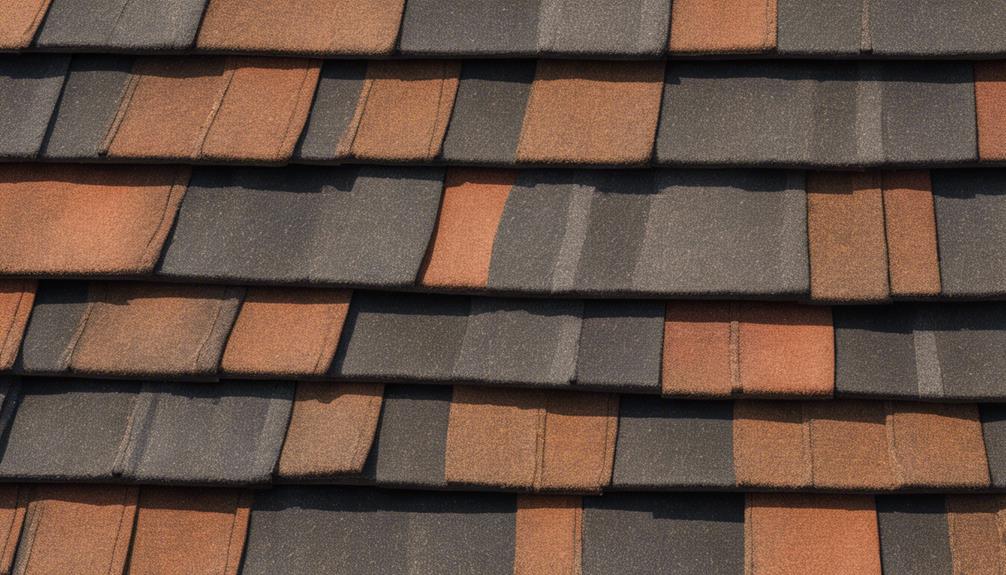
When selecting quality shingles for your roof, the choices may initially appear daunting.
However, with careful consideration and expert advice, we can help you navigate the process smoothly.
By understanding the nuances of factors like durability, style, budget, and material types, you can make an informed decision that not only enhances your home's aesthetics but also ensures long-lasting protection.
Let's explore the world of shingles together and uncover the key elements that will guide you towards selecting the perfect fit for your roof.
Key Takeaways
- Consider climate, architecture, and durability when choosing shingles.
- Shingle durability is crucial for long-term roof protection and cost savings.
- Select shingle style that complements your home's architecture and enhances curb appeal.
- Opt for metal shingles for superior durability, longevity, and energy efficiency.
Factors to Consider Before Choosing Shingles
When selecting shingles for your roof, it's crucial to carefully assess various factors to ensure optimal performance and longevity. The climate and weather conditions of your area play a significant role in determining the type of shingles that will best suit your needs. Different shingles are designed to withstand specific elements, so it's essential to choose ones that can endure the challenges posed by your local climate.
Additionally, considering the architectural style of your home is vital when selecting shingles. The shingles shouldn't only provide protection but also enhance the overall aesthetic appeal of your house. Whether your home has a modern, traditional, or contemporary design, there are shingle options available to complement its architectural style beautifully.
Importance of Shingle Durability
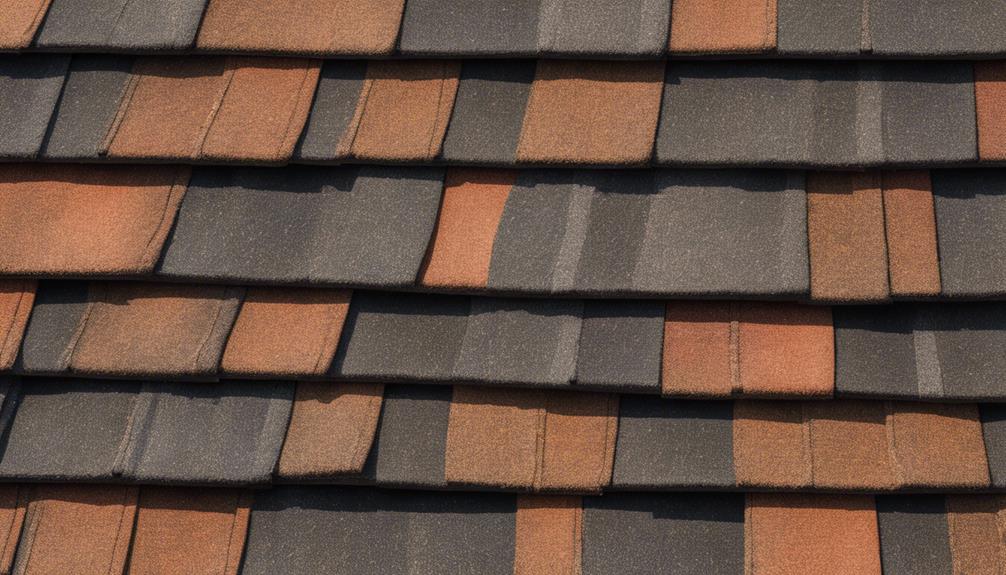
Ensuring the durability of shingles is paramount for safeguarding your roof against the rigors of varying weather conditions and maintaining long-term structural integrity. Shingle durability is a cornerstone of long-term roof performance, protecting against elements like high winds, heavy rain, and hail.
Investing in durable roofing materials such as asphalt or metal can significantly enhance the longevity of your roof, reducing the need for frequent replacements. High-quality shingles not only contribute to the overall lifespan of the roof but also save money in the long run by minimizing maintenance and replacement costs.
How to Select Shingle Style
When choosing a shingle style, it's essential to consider the color selection, material durability factor, and roof style compatibility.
Opting for a color that complements your home's exterior can enhance its overall appeal. Additionally, ensuring the shingle material is durable enough to withstand your local weather conditions is crucial for long-term performance.
Compatibility with your roof's architectural style can tie everything together for a cohesive and visually pleasing look.
Shingle Color Selection
Shingle color selection plays a crucial role in enhancing a home's overall aesthetic appeal and visual impact on its exterior appearance. The chosen shingle color can affect up to 40% of the home's exterior look, making it a significant decision.
When selecting a shingle color, it's essential to consider the architectural style of the house. The color should complement the home's style, harmonizing with its surroundings to create a cohesive look. Additionally, climate considerations come into play; for humid climates, light-colored shingles are recommended for their reflective properties and potential energy efficiency benefits.
Material Durability Factor
To select the right shingle style based on material durability, we must carefully assess the lifespan and resistance factors of various shingle materials available in the market. When considering durability, impact resistance, and fire resistance, the following factors should be taken into account:
- Asphalt shingles lasting 20 years
- Rubber or plastic shingles lasting 22 years
- Metal roof panels lasting 55 years
These aspects are crucial in determining the longevity and resilience of your roof against external elements. By prioritizing these factors, you can ensure a durable and long-lasting shingle style that meets your specific needs and preferences for your home.
Roof Style Compatibility
Considering the pitch and style of your roof is essential when selecting the most suitable shingle style to ensure both functionality and aesthetics are harmoniously achieved. Roof style compatibility plays a crucial role in enhancing the overall curb appeal of your home.
Matching the architectural design of your house with the right shingle style, such as 3-tab, architectural, or luxury shingles, can elevate the visual appeal while providing the necessary protection. Each shingle style offers unique characteristics in terms of durability and aesthetics, allowing you to personalize your roof based on your preferences.
Budgeting for Shingle Selection
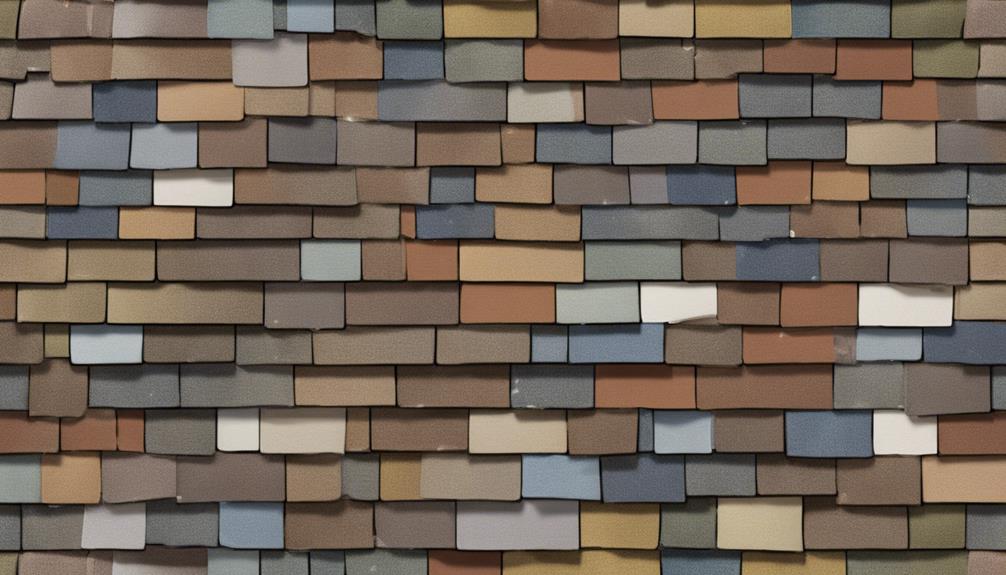
When planning your roofing project, it's crucial to set a clear budget that accounts for the varying costs associated with different types of shingles. Here are some key factors to consider when budgeting for your shingle selection:
- Cost per Square Foot: Determine your budget based on the cost per square foot, which can range from $4 to $30 depending on the type of shingles you choose.
- Lifespan vs. Budget: Consider the lifespan of the shingles in relation to your budget. Some options last 20 years, while others can endure for over 100 years, impacting your long-term cost.
- Installation Expenses: Factor in the installation cost and any additional materials needed when budgeting for your shingle selection. This ensures you have a comprehensive view of the total project cost.
Understanding Asphalt Shingle Types

Asphalt shingles, a common roofing material, are available in three main types: 3-tab, architectural, and luxury, each offering unique aesthetics and levels of durability.
3-tab shingles, the most cost-effective option, have a shorter lifespan compared to architectural and luxury shingles.
Architectural shingles are highly favored for their durability and diverse appearance, often resembling wood shakes or featuring a random pattern.
On the other hand, luxury shingles stand out as the premium choice, emulating the look of slate and typically being the most expensive among asphalt shingle types.
Homeowners can select from these distinct asphalt shingle varieties based on their budget constraints and aesthetic preferences.
The flexibility in performance benefits provided by each type allows for a tailored roofing solution that combines both durability and visual appeal, ensuring a long-lasting and visually pleasing roof for your home.
Exploring Composite Shingle Options
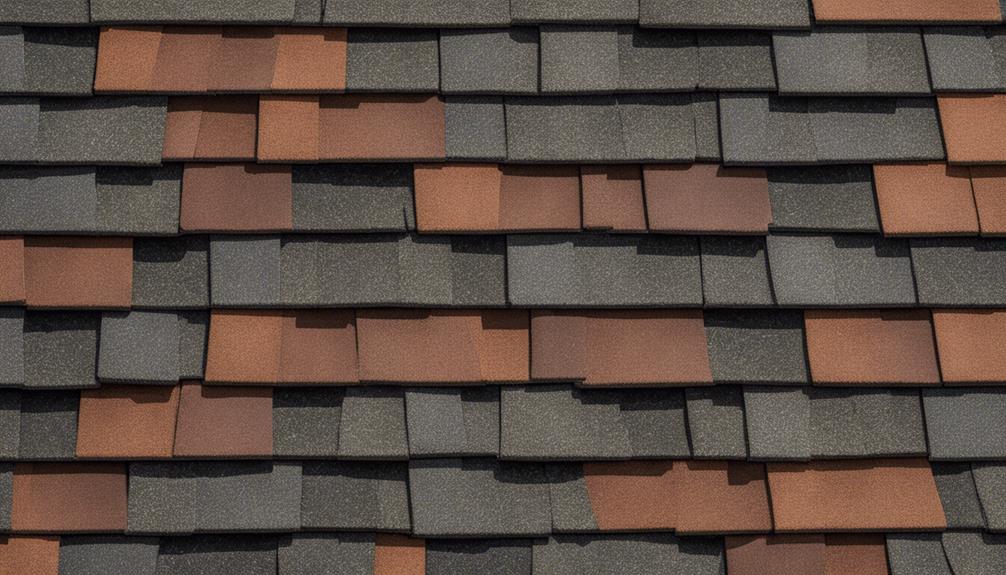
Moving beyond the realm of asphalt shingles, a compelling option to consider for your roofing needs is exploring the diverse world of composite shingle options. These innovative roofing materials offer a range of benefits that cater to both environmental concerns and aesthetic preferences. Here are three key aspects to consider when exploring composite shingle options:
- Eco-friendly: Composite shingles are crafted from recycled materials like rubber and plastics, making them a sustainable choice for environmentally conscious homeowners.
- Authentic Appearance: Despite being eco-friendly, composite shingles don't compromise on style. They can replicate the look of cedar shake or slate tiles, providing a variety of aesthetic choices to enhance your home's curb appeal.
- Durability and Longevity: These shingles are designed to withstand various weather conditions while maintaining their authentic appearance. Their durability ensures a long-lasting roofing solution that combines both style and sustainability.
Consider the versatility and eco-friendly nature of composite shingles when selecting the perfect roofing material for your home.
Benefits of Metal Shingles
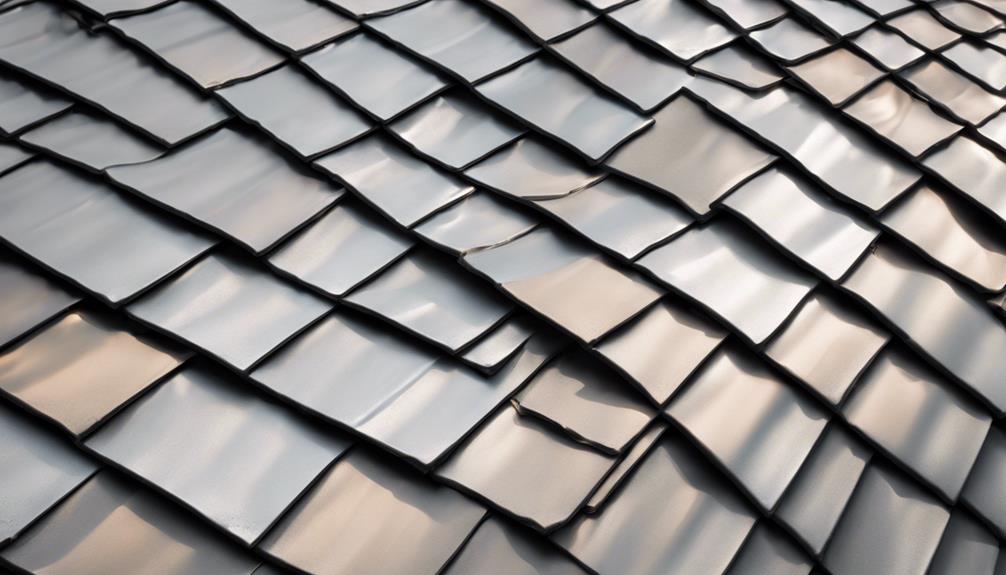
Metal shingles offer exceptional durability, with a lifespan of 40-70 years on average, making them a long-term roofing solution. They aren't only resistant to extreme weather conditions like high winds and hail but also provide energy efficiency, reflecting sunlight to keep homes cooler.
With their fire-resistant properties and eco-friendly recyclability, metal shingles are a sustainable choice that combines longevity, protection, and environmental consciousness.
Durability of Metal Shingles
With a lifespan of up to 50 years, metal shingles offer unparalleled durability and protection for your roof, making them a superior choice for homeowners seeking long-term security.
When considering the durability of metal shingles, here are some key points to keep in mind:
- Highly resistant to fire, rot, and pests, ensuring a secure roofing solution.
- Higher wind resistance compared to traditional asphalt shingles, ideal for areas prone to strong winds.
- Lightweight yet strong, reducing the structural load on your home while offering excellent durability.
Metal shingles not only provide exceptional longevity but also deliver peace of mind knowing your roof is well-protected against various elements, making them a top choice for innovative homeowners.
Energy-Efficient Roofing Option
An energy-efficient roofing option that stands out for its ability to reflect solar heat and reduce cooling costs is the durable and fire-resistant metal shingles. Metal shingles are designed to reflect the sun's rays, which can significantly lower energy bills by up to 25% by keeping your home cooler during hot weather.
These shingles aren't only energy-efficient but also long-lasting, with a lifespan of 40-70 years, reducing the need for frequent roof replacements. In addition to their energy-saving benefits, metal shingles provide enhanced safety as they're fire-resistant, offering added protection for your home.
Furthermore, opting for metal shingles is environmentally friendly, as they're recyclable, making them a sustainable choice for your roofing needs.
Considerations for Slate Shingle Installation
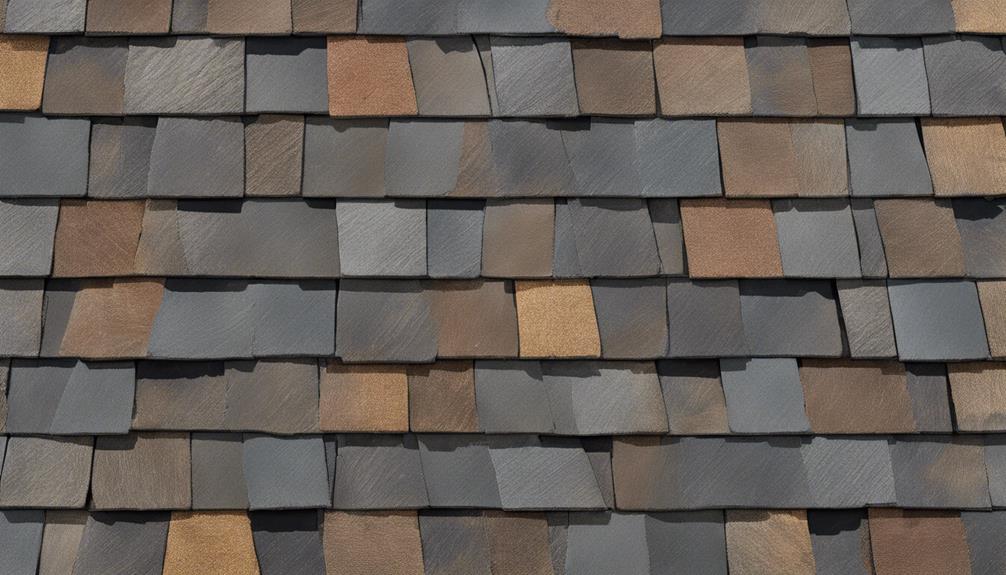
When considering the installation of slate shingles, it's crucial to assess the durability of your roof support system due to the fragility and weight of these premium-quality materials. Slate shingles, crafted from naturally mined slate, are renowned for their durability and longevity, making them a desirable choice for roofing. Here are three essential considerations for slate shingle installation:
- Structural Integrity: Ensure your roof's support system can handle the weight of slate shingles as they're heavier compared to other roofing materials.
- Professional Installation: Due to the material's unique characteristics, it's advisable to hire experienced professionals familiar with slate shingle installation to ensure a proper and long-lasting setup.
- Maintenance Requirements: Understand that while slate shingles have a long lifespan, they require periodic maintenance to uphold their integrity and prevent any potential issues.
Careful planning and attention to detail during the installation process will help maximize the benefits of choosing slate shingles for your roof.
Tips for Choosing the Right Shingles
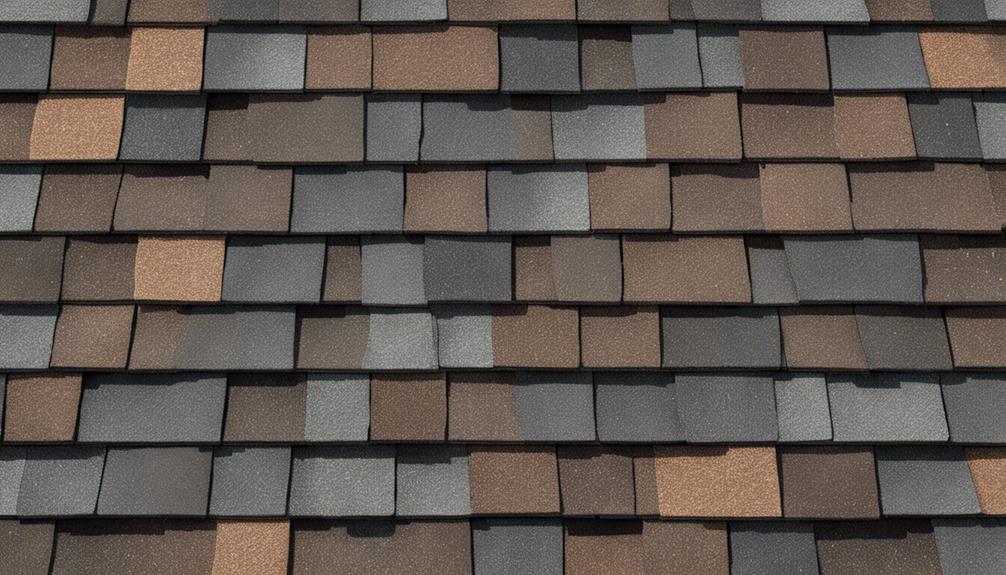
Exploring the diverse range of shingle options available allows homeowners to make informed decisions based on their specific needs and preferences. When selecting the right shingles for your roof, consider the benefits of asphalt, composite, and cedar shake materials. Asphalt shingles are a popular choice due to their affordability, ease of installation, and variety of colors. Composite shingles offer durability and low maintenance, making them a practical option for many homeowners. Cedar shake shingles provide a natural, rustic look and excellent insulation properties, but they may require more upkeep.
To choose the best shingles for your home, evaluate factors such as longevity, weather resistance, and aesthetic appeal. Assess the cost of materials and installation to ensure they fit within your budget. It's also essential to consider the climate conditions in your area to select shingles that can withstand the elements. Seeking advice from roofing professionals and comparing warranties from different manufacturers will help you make an informed decision that enhances the curb appeal and functionality of your roof.
Frequently Asked Questions
How Do I Choose the Best Shingles for My Roof?
When choosing the best shingles for your roof, we consider various factors like climate, aesthetics, and durability. It's crucial to match the shingles' wind resistance, color, and style with your home's needs.
Reflective shingles can also enhance energy efficiency in hot climates. Consulting with professionals can provide valuable advice tailored to your specific requirements.
Which Brand of Roofing Shingles Is Best?
When deciding on the best brand of roofing shingles, it's essential to consider factors like:
- Durability
- Weather resistance
- Material innovation
Brands like GAF, Owens Corning, CertainTeed, Atlas, Malarkey, IKO, and Tamko offer a variety of shingle options tailored to different needs and preferences. Each brand has its strengths, so it's crucial to research and compare their features to determine which one aligns best with your roofing requirements. These companies are often regarded as some of the best shingle brands for roofing due to their commitment to quality, durability, and innovative designs. Many homeowners and contractors rely on these brands for their proven performance and wide range of style and color options. By understanding the unique benefits each brand offers, you can make a more informed decision to ensure your roof stands the test of time.
What Grade of Shingle Is the Best?
When it comes to shingles, the best grade stands out for its superior quality and enhanced features. Premium or luxury shingles offer top-notch durability, extended lifespan, and advanced aesthetics.
Opting for high-grade shingles not only elevates your home's value but also brings long-term cost savings. From impact resistance to enhanced warranty coverage, these top-tier options provide unmatched benefits for a reliable and stylish roofing solution.
Should the Roof Be Darker or Lighter Than the House?
When choosing the roof color, consider if it should be darker or lighter than the house.
In warmer climates, a lighter roof can reflect heat, reducing cooling costs. Conversely, in colder climates, a darker roof can absorb heat, aiding in heating the home.
Harmonizing the roof color with the house's exterior and architectural style is crucial for a cohesive look.
Consulting with local roofing contractors can provide valuable advice tailored to your specific climate and home design.
Conclusion
In conclusion, selecting the right shingles for your roof is like choosing the perfect outfit for your home. Consider the climate, durability, style, and budget to ensure a long-lasting and visually appealing roof.
With options like asphalt, composite, metal, and slate shingles available, there's a perfect match for every home. Trust in quality materials like GAF shingles and consult with professionals to make the best choice for your roofing needs.
Your roof deserves nothing but the best!
- About the Author
- Latest Posts
Introducing Ron, the home decor aficionado at ByRetreat, whose passion for creating beautiful and inviting spaces is at the heart of his work. With his deep knowledge of home decor and his innate sense of style, Ron brings a wealth of expertise and a keen eye for detail to the ByRetreat team.
Ron’s love for home decor goes beyond aesthetics; he understands that our surroundings play a significant role in our overall well-being and productivity. With this in mind, Ron is dedicated to transforming remote workspaces into havens of comfort, functionality, and beauty.
Architecture Home Styles
Top 3 Shingle Manufacturers for Quality Roofing Materials
Are you looking for the ultimate in quality roofing materials?
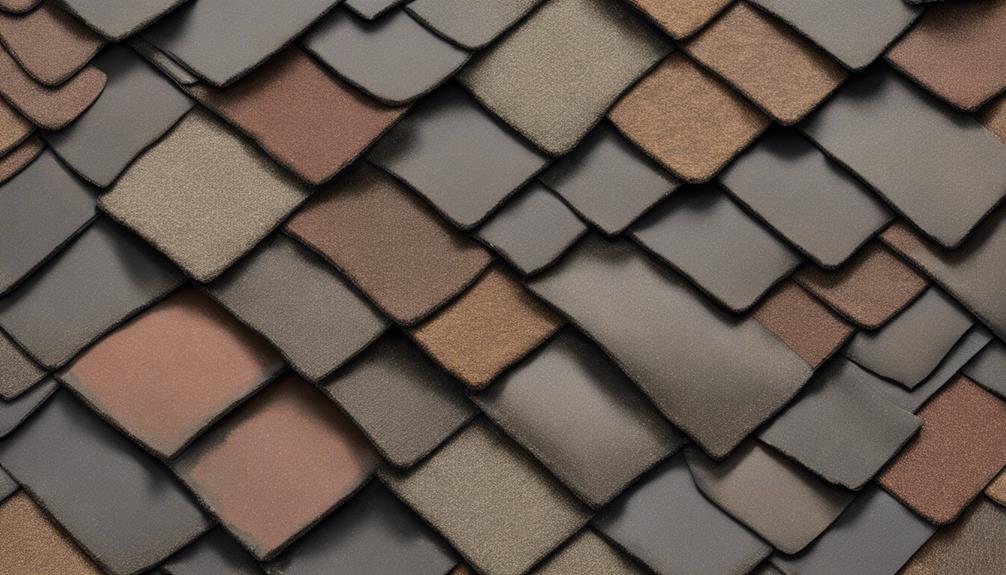
When it comes to choosing the best shingle manufacturer for your roofing needs, it’s important to prioritize durability, aesthetics, and overall performance. While many companies claim to offer quality materials, not all can live up to that standard. By researching customer reviews and industry ratings, you can determine which brands have a proven track record of excellence. Some of the largest shingle manufacturers in the industry have earned their reputations for consistent quality and innovation, making them dependable choices for homeowners and contractors. Selecting a reputable manufacturer will ensure that your investment provides long-lasting protection and visual appeal.
In the competitive market of roofing materials, three companies have consistently set themselves apart for their innovative products and reliable warranties. These top three shingle manufacturers have earned a reputation for excellence, but which one truly stands above the rest?
Let's explore the top choices for quality roofing materials to find out.
Key Takeaways
- Leading manufacturers like GAF, Owens Corning, and CertainTeed excel in quality roofing materials.
- Innovative shingle lines from Owens Corning, TAMKO, and Malarkey offer diverse options.
- Brands prioritize durability, sustainability, and regional suitability for residential roofing needs.
- Certification, warranties, and a commitment to excellence define these top shingle manufacturers.
Leading Shingle Manufacturers in the Industry
Leading the roofing industry are top-tier manufacturers such as GAF, Owens Corning, and CertainTeed, renowned for their exceptional quality roofing materials. These asphalt shingle manufacturers offer a wide range of shingle options, including architectural shingles that provide both durability and aesthetic appeal for residential and commercial properties.
Owens Corning, for example, not only boasts a rich history since 1938 but also showcases innovative shingle lines like the popular Duration FLEX, catering to diverse customer preferences.
Similarly, TAMKO, founded in 1944, stands out with its diverse shingles such as Titan XT and Heritage architectural shingles, meeting the demands for both style and performance in the roofing materials market.
Malarkey Roofing Products, headquartered in Portland, Oregon, focuses on sustainability in manufacturing and offers shingle lines like Highlander and Windsor, appealing to environmentally conscious consumers.
With IKO being the world's largest exporter of asphalt shingles, its variety of shingle options like Marathon Plus AR and Dynasty demonstrate a commitment to providing high-quality and diverse shingle solutions for roofing projects.
Top Choices for Quality Roofing Materials
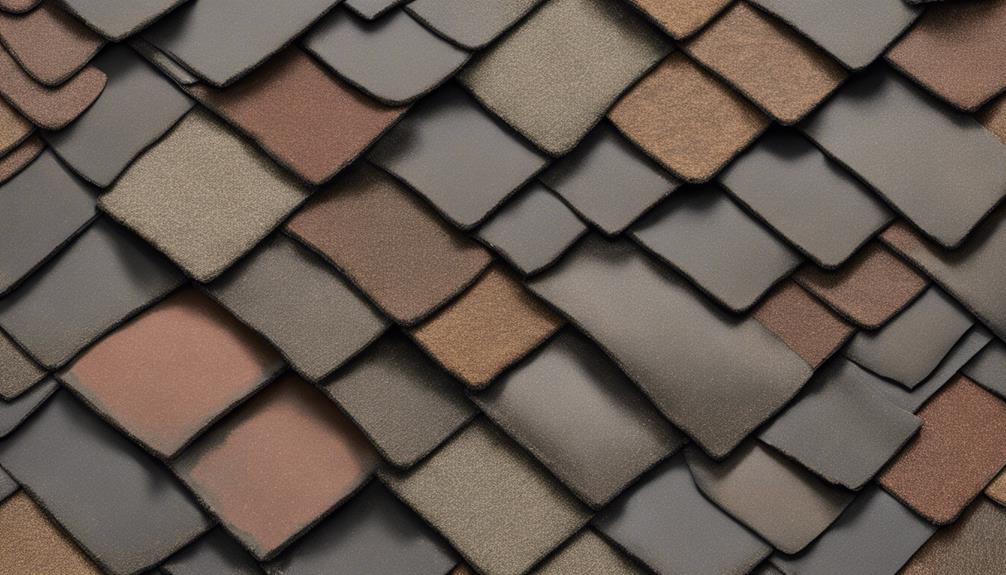
Among the top choices for quality roofing materials, several manufacturers stand out for their exceptional products and warranties. When considering top-tier manufacturers in the industry, GAF, Owens Corning, and CertainTeed are names that consistently deliver on quality and durability.
Here are three standout options from these reputable companies:
- GAF Timberline Roofing Shingles: GAF is renowned for its Timberline series, known for its durability and aesthetic appeal. Certification is required for enhanced warranty benefits, ensuring long-lasting protection for your roof.
- Owens Corning Duration FLEX: Owens Corning offers the innovative Duration FLEX line, providing a range of durable shingle options to suit different preferences and needs. These shingles are designed to withstand various weather conditions and maintain their quality over time.
- CertainTeed Grand Manor luxury shingle: CertainTeed stands out for its wide variety of styles and colors of asphalt shingles, including the luxurious Grand Manor line. These shingles offer both durability and elegance, making them a top choice for quality roofing materials.
Best Shingle Brands for Your Roof
We'll explore the top shingle brands renowned for their quality and durability in the roofing industry. GAF, Owens Corning, and CertainTeed stand out as leaders offering an array of shingle options that cater to various budgets and preferences. Owens Corning particularly shines by providing a range from budget-friendly to luxury shingles, all boasting high tensile strength and exceptional durability. These brands understand the importance of regional variations in climates and styles, ensuring that their shingles are suitable for diverse residential roofing needs.
When considering the best shingle brands for your roof, it's crucial to prioritize durability and quality. GAF, Owens Corning, and CertainTeed excel in meeting these criteria, making them top choices for homeowners looking for reliable roofing solutions. Whether you prefer budget-friendly options or seek the luxury of high-end shingles, these brands have you covered with their innovative products designed to withstand the test of time.
Frequently Asked Questions
What Is the Best Quality Roofing Shingles?
When it comes to the best quality roofing shingles, it's essential to consider factors like durability, design, and warranty.
Our team recommends shingles from GAF, Owens Corning, and CertainTeed for their exceptional quality and longevity. Each of these manufacturers offers a range of high-quality shingles with various styles and color options to suit different preferences.
These shingles are designed to withstand the elements and provide long-lasting protection for your roof.
What Is a Number 1 Shingle?
When it comes to roofing, a number 1 shingle signifies the pinnacle of quality and performance. These top-tier shingles boast exceptional durability, longevity, and protection against the elements.
Crafted by industry-leading manufacturers, number 1 shingles undergo rigorous testing and feature innovative technologies. Homeowners and contractors favor these shingles for their reliability and aesthetic appeal.
Investing in a number 1 shingle guarantees a high-quality roofing solution that delivers long-term value.
What Roof Shingles Last the Longest?
When it comes to roof shingles that last the longest, there are several top contenders in the market. These shingles, such as CertainTeed's Grand Manor, GAF's Timberline HDZ®, and Owens Corning's Duration FLEX, are known for their exceptional longevity with 50-year warranties.
The durability and reliability of these shingles make them stand out among other options, providing homeowners with peace of mind and long-lasting performance.
Which Shingles Are Best GAF or Owens Corning?
When comparing GAF and Owens Corning shingles, we find both manufacturers offer top-notch quality. GAF excels with its Timberline Roofing Shingles, requiring certification for enhanced warranty benefits.
On the other hand, Owens Corning's range includes the popular Duration FLEX line. Both companies provide 50-year warranties, ensuring long-lasting performance.
Consider factors like design, warranty, and performance to make the best choice between GAF and Owens Corning shingles.
Conclusion
In conclusion, when it comes to quality roofing materials, CertainTeed, GAF, and Owens Corning are the top choices in the industry.
With their durable and innovative asphalt shingles, these manufacturers offer a wide range of styles and colors to suit any home.
Did you know that combined, these three manufacturers hold over 60% of the market share in the roofing industry?
Their reputation for excellence and reliability makes them the go-to brands for homeowners looking for top-notch roofing materials.
- About the Author
- Latest Posts
Introducing Ron, the home decor aficionado at ByRetreat, whose passion for creating beautiful and inviting spaces is at the heart of his work. With his deep knowledge of home decor and his innate sense of style, Ron brings a wealth of expertise and a keen eye for detail to the ByRetreat team.
Ron’s love for home decor goes beyond aesthetics; he understands that our surroundings play a significant role in our overall well-being and productivity. With this in mind, Ron is dedicated to transforming remote workspaces into havens of comfort, functionality, and beauty.
Architecture Home Styles
10 Cheapest Building Materials for Your Next Project
Astonishingly affordable building materials await in this insightful guide, promising both savings and functionality – don't miss out on these cost-effective options!

Let’s start by highlighting a commonly ignored aspect of construction – the affordability factor. Within the wide range of building materials that exist, there are some hidden gems that provide both cost-effectiveness and functionality. These options may pleasantly surprise you with their versatility and potential savings, making them a worthwhile consideration for your upcoming project.
From traditional choices like concrete and plywood to more unconventional picks such as straw and recycled materials, the possibilities are intriguing. Stay tuned to discover how these materials can transform your project without breaking the bank.
Key Takeaways
- Concrete, plywood, reclaimed wood, and recycled materials offer cost-effective solutions for construction projects.
- Incorporating these materials can lead to budget-friendly choices, tax incentives, and reduced environmental impact.
- Corrugated metal, bamboo, industrial steel, and straw provide affordable and sustainable options for various applications.
- Using alternative and sustainable materials contributes to cost-effectiveness and eco-friendly construction practices.
Concrete
When constructing a project, concrete proves to be an essential and cost-effective building material due to its durability and versatile applications. Concrete is composed of water, Portland cement, and aggregates such as sand and gravel. This mixture creates a robust material that's ideal for foundations, walls, and floors.
The use of precast concrete elements further enhances its cost-effectiveness by reducing construction time and labor costs. Additionally, concrete's thermal mass properties allow it to regulate indoor temperatures efficiently, contributing to energy savings.
The durability of concrete structures is exceptional, with proper maintenance ensuring longevity for decades. Its fire-resistant properties add to its appeal as a reliable construction material. Investing in concrete not only provides a sturdy foundation but also offers long-term cost savings, making it a practical choice for various construction projects.
Plywood
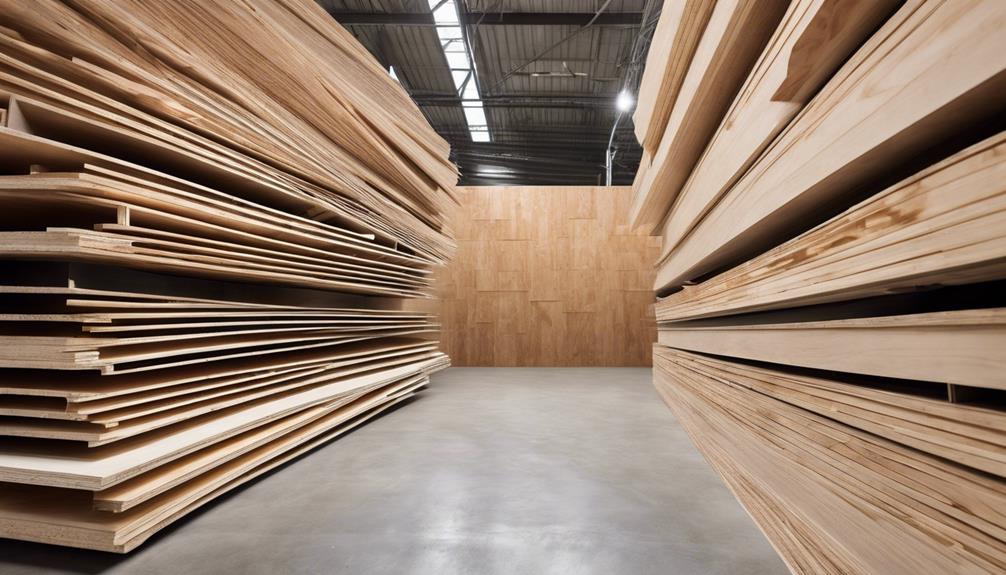
When considering plywood, it's essential to understand the different grades available and their respective qualities. These grades determine the appearance and performance of the plywood in various applications.
Knowing how to select the appropriate grade for your project can significantly impact its durability and overall success.
Plywood Grades
In construction projects, determining the appropriate plywood grade is essential to strike a balance between cost and quality. Plywood is graded into categories such as A-grade, B-grade, C-grade, and D-grade, based on the quality of the front and back veneers.
A-grade plywood features a smooth, sanded surface suitable for visible applications, while B-grade may contain some knots and defects, making it ideal for non-visible areas. C-grade plywood allows for knots and defects, commonly used for structural purposes, whereas D-grade plywood exhibits visible defects and is considered the lowest quality.
The price of plywood varies depending on the grade, thickness, and wood type, with higher grades generally commanding a higher cost. Selecting the right plywood grade is crucial for achieving the desired balance of cost-effectiveness and quality in construction projects.
Plywood Applications
Moving from our discussion on Plywood Grades, understanding the various Plywood Applications is crucial for maximizing the cost-effectiveness and structural integrity of construction projects. Plywood, a versatile building material known for its strength and durability, finds multiple uses in construction, including:
- Walls: Plywood serves as a sturdy base for interior and exterior walls, providing stability and support.
- Roofs: Plywood sheathing offers a reliable substrate for roofing materials, ensuring a strong and durable roof structure.
- Floors: Plywood forms a solid underlayment for various types of flooring, enhancing stability and longevity.
- Structural Applications: Plywood is commonly employed in beams, columns, and other load-bearing elements due to its strength and resilience.
- Durability: Plywood's resistance to warping and stability make it ideal for long-lasting construction projects, both in DIY endeavors and professional settings.
Reclaimed Wood
Utilizing reclaimed wood in construction projects presents a sustainable and cost-effective alternative to traditional lumber sources. Reclaimed wood is salvaged from old structures like barns, factories, and warehouses, reducing the need for new lumber. It offers unique character, history, and patina, adding charm and authenticity to a project. This type of wood can be repurposed for flooring, furniture, accent walls, and other decorative elements, providing a distinctive touch to the design. By opting for reclaimed wood, builders and homeowners contribute to reducing deforestation, carbon footprint, and waste in construction, aligning with sustainable practices.
| Benefits of Reclaimed Wood | ||
|---|---|---|
| Sustainable sourcing | Unique character | Cost-effective alternative |
| History and patina | Reduction in waste | Authenticity to projects |
| Versatile applications | Contribution to sustainability | Distinctive design elements |
Recycled Materials

When considering building materials, it's essential to explore the cost-effective eco-friendly options available through recycled materials.
Sustainable building practices can be achieved by incorporating recycled materials, reducing the environmental impact of construction projects.
The benefits of recycling extend beyond just cost savings, offering a way to create structures with a lower carbon footprint and contribute to a more sustainable future.
Cost-Effective Eco-Friendly Options
Incorporating cost-effective eco-friendly options in construction projects, such as recycled materials like timbercrete and ecobricks, can provide sustainable and affordable alternatives.
- Timbercrete: A blend of sawdust, concrete, and other materials, offering durability and insulation properties.
- Ecobricks: Plastic bottles packed with non-biodegradable waste, serving as building blocks for walls and structures.
- Reduced Environmental Impact: Using recycled materials decreases the need for raw resources and minimizes waste.
- Lower Costs: Recycled materials are often cheaper than new ones, helping reduce overall project expenses.
- Green Building Incentives: Incorporating eco-friendly options can qualify projects for tax incentives and certifications.
Sustainable Building Practices
Considering sustainable building practices, utilizing recycled materials like timbercrete and ecobricks offers cost-effective and environmentally friendly options for construction projects. Incorporating these recycled materials not only aligns with green building incentives but also reduces environmental impact.
Using salvaged materials or purchasing leftovers can provide both affordable and sustainable alternatives for construction needs. These materials not only lower costs but also expedite permitting processes and alleviate tax burdens.
Additionally, government-level green building incentives are often available for projects that incorporate recycled building materials, further incentivizing their use. By embracing recycled materials in construction projects, builders can contribute to a more sustainable future while reaping the benefits of affordable and eco-friendly building practices.
Benefits of Recycling
To maximize the efficiency and sustainability of construction projects, utilizing recycled materials such as timbercrete and ecobricks is crucial for reducing environmental impact and promoting cost-effective building practices. Recycling building materials offers numerous benefits:
- Reduces environmental impact by reusing resources and diverting waste from landfills.
- Lowers costs and expedites permitting processes.
- Contributes to a greener and more sustainable construction industry.
- Provides financial benefits for green building practices through salvaging materials or purchasing leftovers.
- Accesses green building incentives available at various government levels for using recycled materials in construction projects.
Corrugated Metal

Corrugated metal, known for its durability and recyclability, is a cost-efficient material commonly utilized in construction projects. This material offers a range of benefits, making it a popular choice for those looking for low-cost building materials. Corrugated metal sheets are lightweight, easy to install, and provide excellent weather resistance, making them suitable for various applications such as roofing, siding, and wall cladding. The modern industrial aesthetic it offers is an added bonus for contemporary construction projects.
| Benefits of Corrugated Metal | |
|---|---|
| Durability | Known for its long-lasting properties and resistance to wear. |
| Recyclability | Environmentally friendly option that supports sustainability. |
| Cost-Efficient | Affordable material suitable for budget-friendly projects. |
| Easy Installation | Lightweight sheets that are simple and quick to install. |
For those seeking a balance between cost-effectiveness and quality, corrugated metal stands out as an innovative choice in the realm of construction materials.
Bamboo
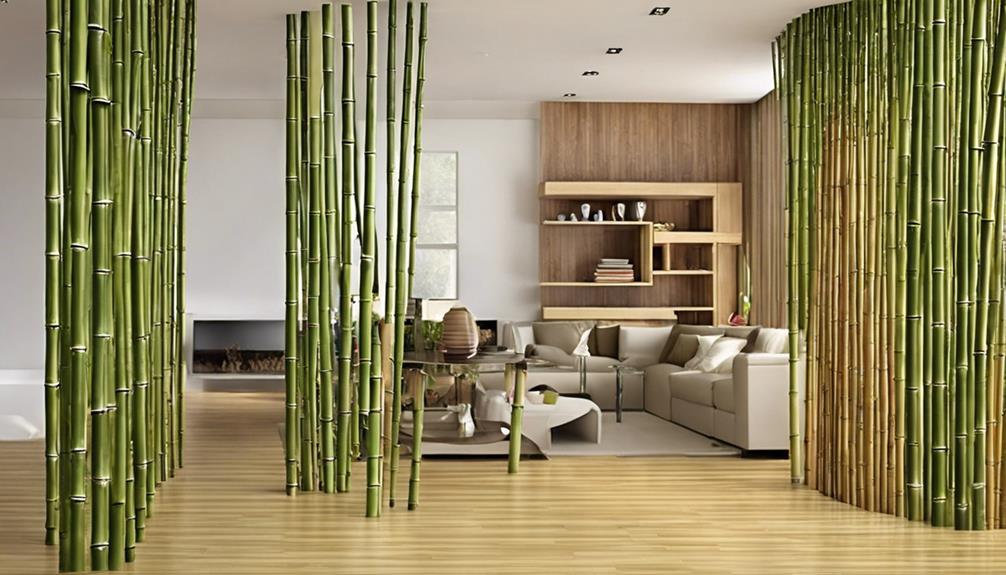
Bamboo, a versatile and sustainable construction material, offers numerous benefits for cost-effective and eco-friendly building projects. In India, bamboo is a green and sustainable resource widely used in construction for its many advantages. Here are some key points to consider when using bamboo for your next project:
- Abundant Resource: Bamboo is readily available in India, making it a sustainable choice for construction projects.
- Structural and Aesthetic Use: It serves both structural purposes and adds an aesthetic flair to buildings.
- Seismic Resilience: Bamboo's strength and flexibility make it advantageous in seismic regions.
- Fire and Termite Resistance: Bamboo is naturally fire-proof and can be treated to be termite-proof, enhancing its durability.
- Cost-Effective Option: Bamboo is a versatile and affordable material suitable for various construction applications.
Consider incorporating bamboo into your next project for an innovative and environmentally friendly construction solution.
Industrial Steel
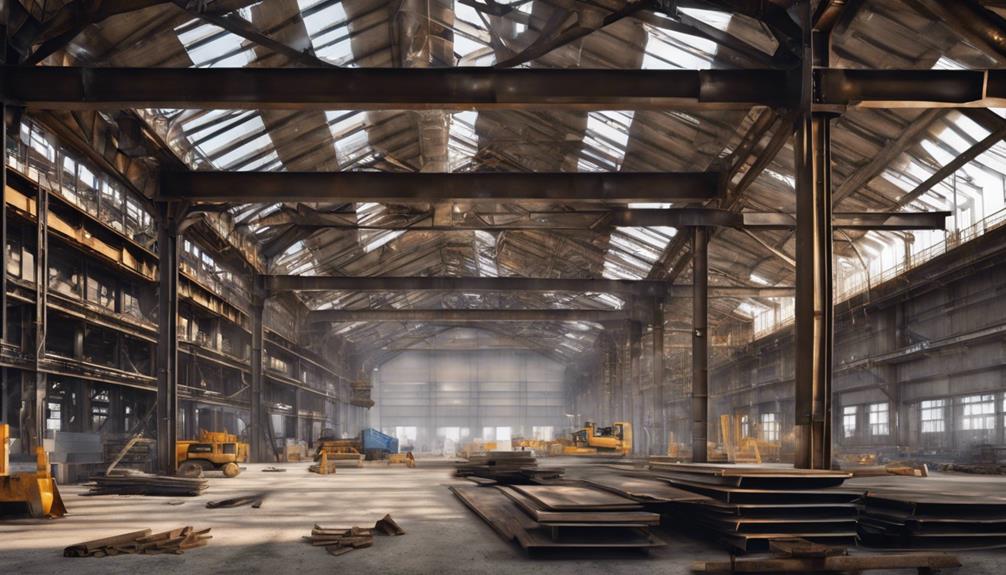
As we shift our focus to industrial steel, a robust and cost-efficient building material commonly utilized in industrial-style homes, we delve into its superior durability and structural integrity, making it a favored option for diverse construction projects. Industrial steel, often used in steel framing, offers exceptional strength and longevity, providing reliable support for various structures. Its cost-efficiency stems from the material's durability, reducing the need for frequent maintenance and replacements. The recyclability of steel further enhances its appeal, aligning with sustainable building practices and environmental consciousness.
To showcase the advantages of industrial steel, let's explore a comparison table highlighting its key features: To showcase the advantages of industrial steel, let’s explore a comparison table highlighting its key features: Steel is renowned for its durability, versatility, and cost-efficiency, making it a preferred choice across various industries. When conducting a steel building cost comparison, it becomes evident that steel structures often offer significant savings in terms of long-term maintenance and energy efficiency. Additionally, their quick construction timelines further contribute to overall affordability and project feasibility.
| Industrial Steel | |
|---|---|
| Durability | Excellent |
| Structural Integrity | High |
| Recyclability | Yes |
This table underscores the superior characteristics of industrial steel, emphasizing its cost-efficiency, structural integrity, and eco-friendly nature, making it a top choice for modern construction endeavors.
Straw
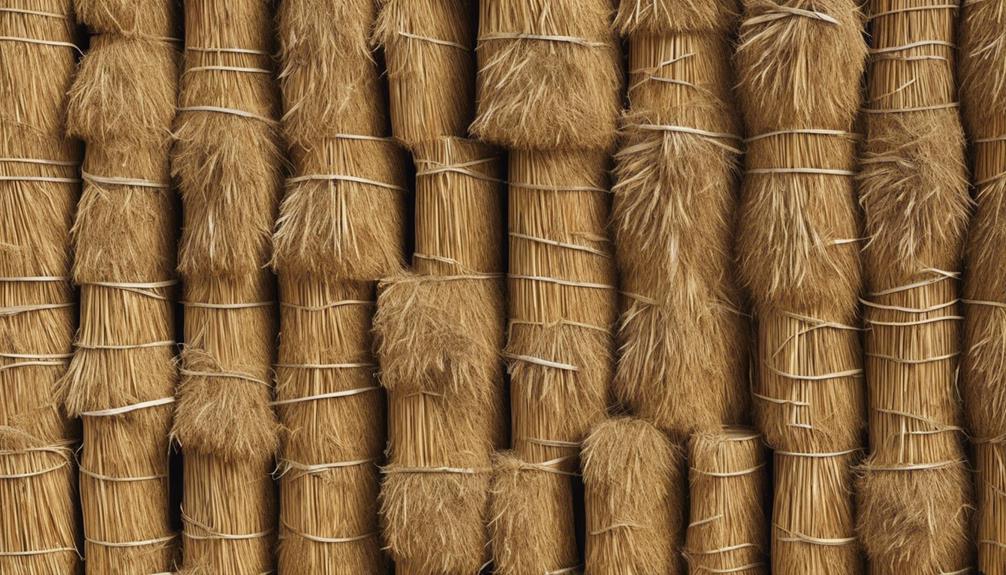
Utilizing straw as a building material offers a cost-effective solution with exceptional thermal and insulating properties, making it a sustainable choice for construction projects. Straw isn't only budget-friendly but also provides excellent insulation and thermal regulation, ideal for maintaining comfortable indoor temperatures while reducing energy consumption.
When considering straw for your next project, envision these key points:
- Renewable Resource: Harvested from crops like wheat, rice, or barley, straw is a renewable and eco-friendly building material.
- Affordability: The abundance and low cost of straw make it an economically attractive option for construction projects.
- Insulation: Straw bales excel at providing insulation, keeping interiors warm in winter and cool in summer.
- Structural Support: Beyond insulation, straw bales can serve as load-bearing walls, offering both thermal efficiency and structural integrity.
- Sustainability: By choosing straw as a building material, you contribute to sustainable construction practices, reducing environmental impact and overall building costs.
Plastic
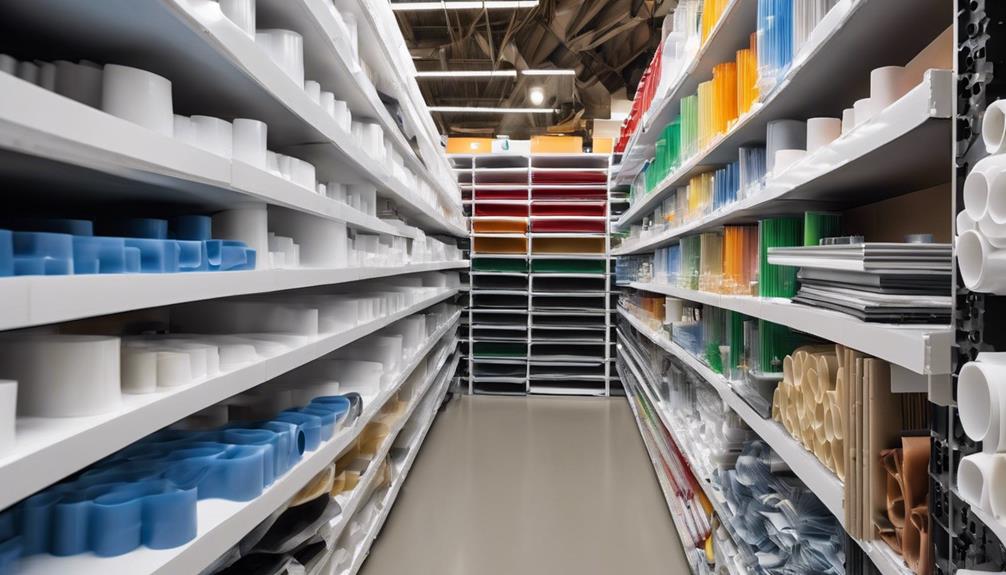
Plastic offers a plethora of benefits in construction.
From its versatility to its sustainability, our discussion will focus on the advantages of using plastic as a building material.
Its cost-effectiveness compared to traditional alternatives will also be highlighted.
Exploring these points will shed light on why plastic is a compelling option for your next construction project.
Plastic Benefits
Numerous construction projects benefit from the versatile applications and eco-friendly aspects of utilizing plastic as a building material.
- Plastic offers a plethora of design possibilities, such as roofing, insulation, and structural elements.
- Recycled plastic presents an eco-friendly and cost-effective alternative for construction materials.
- Its lightweight nature makes it ideal for various interior and exterior construction needs.
- Plastic is known for its durability, ensuring longevity in diverse building components.
- When treated and processed correctly, plastic can play a significant role in sustainable construction practices, reducing environmental impact while promoting innovation.
Plastic Cost-effectiveness
Considering its abundance and affordability, plastic stands out as a notably cost-effective building material. Recycled plastic can be repurposed into construction materials, reducing waste and costs. Plastic panels or sheets are lightweight, easy to install, and suitable for various projects. Plastic materials are durable, weather-resistant, and low maintenance, offering long-term cost savings. Utilizing plastic in construction can lead to innovative and sustainable building solutions at a low cost.
| Benefits of Plastic in Construction | |
|---|---|
| Abundance and affordability | Reduced waste and costs |
| Lightweight and easy to install | Weather-resistant and low maintenance |
| Durable with long-term cost savings | Innovative and sustainable solutions |
Glass
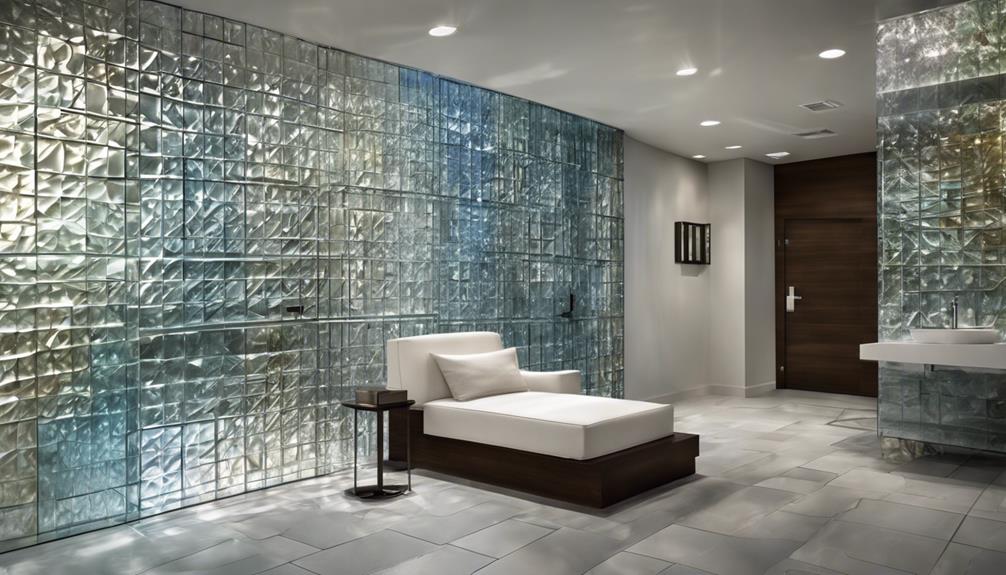
How can glass revolutionize the design and functionality of your next building project? Glass is a versatile material that offers numerous benefits, making it a popular choice in modern construction. Here are some key points to consider:
- Lightweight: Glass is significantly lighter than traditional building materials, facilitating easier handling and transportation during construction.
- Natural Light: Glass allows ample natural light to penetrate indoor spaces, creating bright and airy environments while reducing the dependency on artificial lighting.
- Modern Aesthetic: Utilizing glass in windows and facades can give structures a sleek and contemporary look, adding a touch of sophistication to any design.
- Variety of Types: From tempered to laminated and insulated glass, there are various options available to suit different construction requirements, each offering unique advantages.
- Sustainability: Glass is recyclable and can be repurposed, aligning with sustainable building practices and contributing to a reduced environmental impact.
Incorporating glass into your building project can enhance both the visual appeal and efficiency of the structure.
Frequently Asked Questions
What Is the Least Expensive Building Material?
When considering the least expensive building material, factors like cost, durability, and sustainability are crucial. Fly ash bricks, bamboo, recycled materials like timbercrete, ecobricks, compressed earth bricks, and reinforced mud bricks are all budget-friendly options.
Each material offers unique benefits, such as strength gains, lightweight properties, sustainability, and fire-proofing. Choosing the most cost-effective solution involves balancing these factors to meet the project's requirements efficiently.
What Is the Cheapest Building to Build?
When considering what type of building to construct, affordability is a key factor. Our analysis reveals that tiny homes, shipping container homes, cob construction homes, ranch homes, and colonial homes all offer varying levels of cost-effectiveness.
Each option presents unique advantages and challenges, making it crucial to weigh the pros and cons before deciding. This thorough evaluation ensures that we make informed choices for our next building project.
What Is the Cheapest Type of Structure to Build?
When considering the cheapest type of structure to build, it's important to assess factors like materials, labor, and overall design.
Tiny homes are often the most cost-effective option, with a price point around $97,500, offering affordability and sustainability.
Ranch homes are also a budget-friendly choice at an average of $150 per square foot, providing a straightforward layout with customization options.
Shipping container homes offer unique and affordable living spaces, ranging from $16,500 to $44,500 on average.
What Is the Lowest Cost Construction Method?
When considering the lowest cost construction method, we often turn to earth-based materials like compressed earth bricks or fly ash hollow bricks. These sustainable, fire-proof, and lightweight options provide an efficient and economical building solution.
Compressed earth bricks consist of soil, lime, and cement, while fly ash hollow bricks are made from fly ash, stone powder, and sand. By adding waterproofing and insulative additives, these materials can further reduce construction expenses.
Conclusion
In conclusion, incorporating affordable building materials like concrete, plywood, and recycled materials can help you achieve your construction project goals while staying within budget.
With so many cost-effective options available, why not choose sustainable and durable materials to create a space that's both functional and environmentally friendly?
Consider these ten cheapest building materials for your next project and make a lasting impact.
- About the Author
- Latest Posts
Introducing Ron, the home decor aficionado at ByRetreat, whose passion for creating beautiful and inviting spaces is at the heart of his work. With his deep knowledge of home decor and his innate sense of style, Ron brings a wealth of expertise and a keen eye for detail to the ByRetreat team.
Ron’s love for home decor goes beyond aesthetics; he understands that our surroundings play a significant role in our overall well-being and productivity. With this in mind, Ron is dedicated to transforming remote workspaces into havens of comfort, functionality, and beauty.
-

 Vetted2 weeks ago
Vetted2 weeks ago15 Best Drip Irrigation Systems to Keep Your Garden Thriving
-

 Vetted4 days ago
Vetted4 days ago15 Best Sports Laundry Detergents for Keeping Your Activewear Fresh and Clean
-
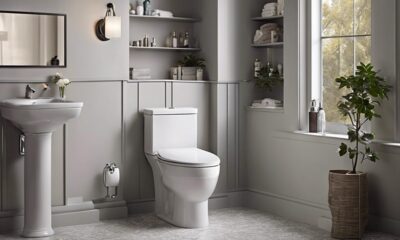
 Vetted6 days ago
Vetted6 days ago15 Best Tall Toilets for Seniors That Combine Comfort and Safety
-

 Vetted1 week ago
Vetted1 week ago15 Best Dish Scrubbers to Keep Your Kitchen Sparkling Clean
-

 Beginners Guides3 weeks ago
Beginners Guides3 weeks agoDesigning Your Retreat Center – Essential Tips
-
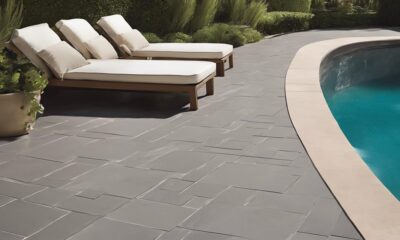
 Vetted4 weeks ago
Vetted4 weeks ago15 Best Tile Adhesives for Outdoor Use – Top Picks for Durable and Weather-Resistant Installations
-

 Beginners Guides3 weeks ago
Beginners Guides3 weeks agoAre Retreats Profitable
-

 Decor1 week ago
Decor1 week agoWhat Is Eclectic Home Decor




